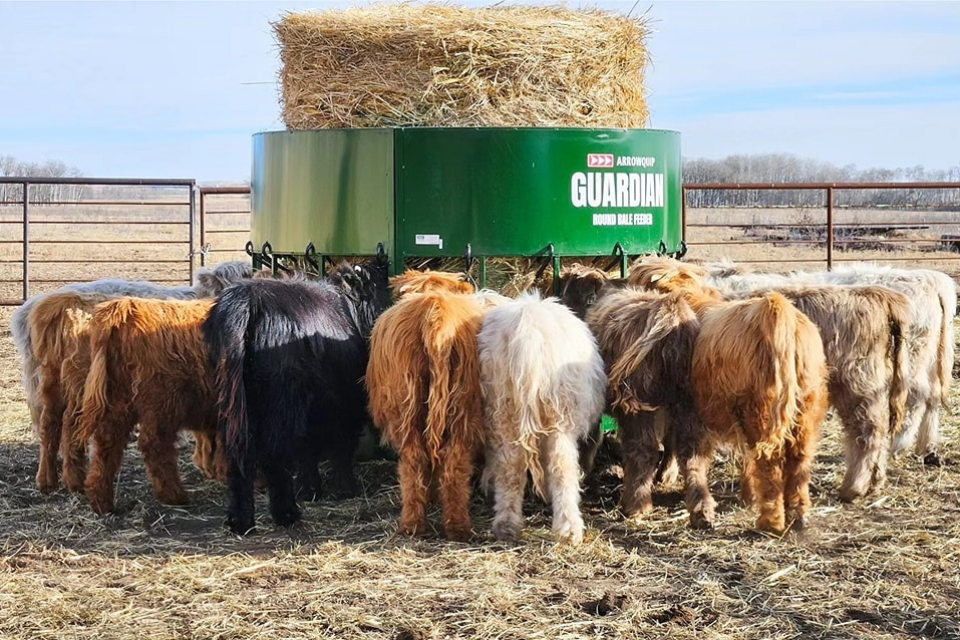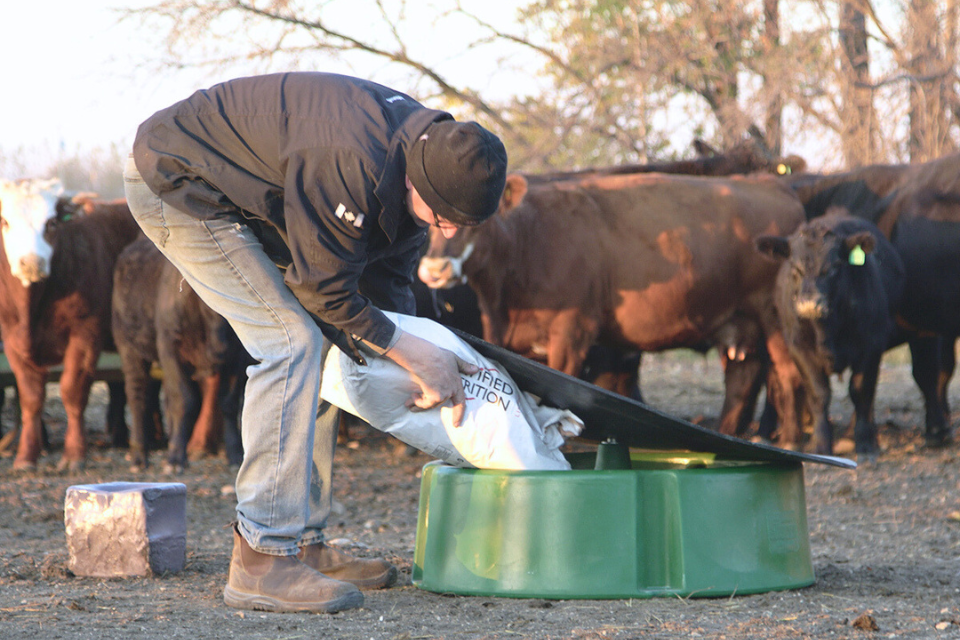Cut Costs and Boost Herd Health with a Cattle Mineral Feeder and Round Bale Feeder This Winter
Why Winter Feeding Strategies Matter for Cattle Health and Costs
Go Back to All BlogsPosted on: November 29, 2023
Updated on: January 9, 2026
Author: Dana Charban
SHARE:
The cold winter months present their own unique challenges when it comes to your cattle operation. When the temperatures drop, your livestock will require additional care to ensure they maintain optimal body condition – especially if you’re preparing for calving season. One of the biggest changes will be the way you feed your cattle. Adjusting your feeding schedule can lead to increased costs and time, so exploring feeding solutions that are simple and economical, like getting a cattle mineral feeder or round bale feeder, will be well worth it in the long run. So, how exactly will investing in these feeding solutions help you save, without sacrificing herd health?
1. Minimizing Feed Waste
Using proper feeding equipment is essential to prevent waste and save money, especially during the difficult winter months. While various methods such as using uncovered tubs, scattering minerals on the ground, or rolling bales out may be used, they can take more time and aren’t as cost-effective. When minerals are left in the open, they mix with snow and rain, increasing the chance of cattle finding the mineral less appetizing.
This can lead to waste, decreased intake, and potential nutrient imbalance. Snow and rain can also cause loose mineral to become wet which causes clumping, freezing and spoilage which can lower the value of the supplements. The same rings true for mineral blocks and lick tubs. When mixed with water or snow, the value decreases and can lead to additional waste.
To avoid these issues, it is recommended to use a high-quality, covered cattle mineral feeder that is designed to protect mineral against the elements, and cattle pushing, making them last longer and provide more for your cattle.
Similarly, a no-waste round bale feeder for cattle is designed to minimize waste by keeping bales suspended off the ground and protected from the elements, which is particularly helpful in the winter when weather conditions can be less than favorable. Elevating bales ensures they stay fresh longer by keeping them away from animal waste, ground moisture, and other contaminants that may be found in the snow and soil.
2. Managing Cattle Intake
Proper nutrition in cattle is crucial during winter as colder temperatures and reduced forage availability can impact the health and performance of your herd. Proper mineral feeders and no-waste hay feeders are important tools you can use to ensure cattle’s nutritional needs are being met. Not only should a well-designed cattle mineral feeder be covered from the elements, but it should also allow for multiple cattle to access it at once. This helps prevent dominant animals from taking over the feeder and in most cases, it’s wise to invest in more than one mineral feeder for cattle, depending on your herd size.

When it comes to round bale feeders, you want to look for certain features that work for your cattle, rather than against them. These kinds of feeders often feature a cone-shaped bale suspension system built with rods and chains to keep the bales off the ground. This not only prevents waste, but it can also control cattle intake by slowing them down to prevent overeating. This type of cattle hay feeder can also help prevent picky cattle from digging through the bales to get the best bits of hay.
3. Maximizing Your Savings
Investing in durable feeding equipment can involve a higher cost upfront, but it will pay off in the long run. High-quality mineral feeders for cattle and round bale feeders should be able to withstand anything that gets thrown at them – from rowdy cattle to unpredictable weather. This will guarantee they last for years to come, leading to significant savings over time for you.
A durable mineral feeder should also be built using heavy-duty materials, and have weatherproof covers high walls to prevent spillage, and exterior anchor points to stabilize the mineral feeder and avoid the risk of cattle tipping it. This can save you money, as you’ll be replacing mineral less often.

Bale feeders for cattle should also be built with quality materials, as you use this piece of equipment almost daily. A durable feeder means reduced maintenance and repair or replacement costs, which is something every rancher dreams of. Some no-waste round bale feeders are even built to be reversed – all you do is remove the rods and chain, flip the feeder, then reinstall the rods and chain. This can easily double the lifespan of your feeder, saving you more for years to come.
As the colder months approach, it is more important than ever to not only evaluate the way you feed your livestock, but also how to prepare your ranch. By investing in well-designed, durable feeding equipment, and making sure you’re ready for freezing temperatures, you can easily achieve optimal nutrition for your cattle and keep them in top condition this winter season without breaking the bank
What are your winter feeding strategies? We’d love to know! Share your thoughts in the comments below.